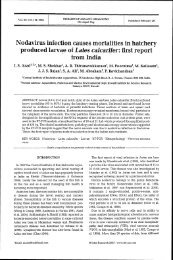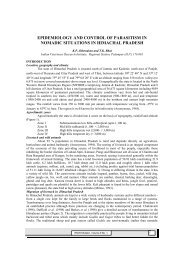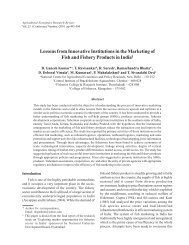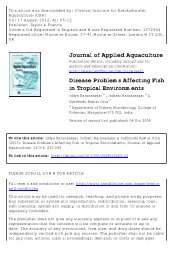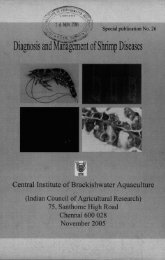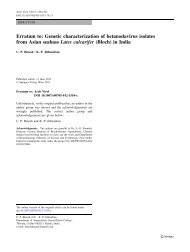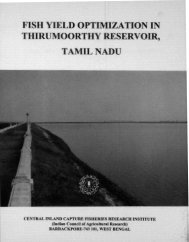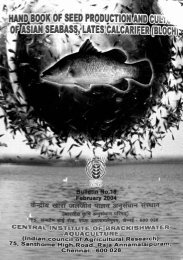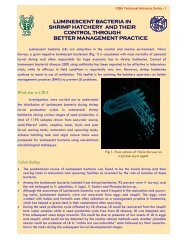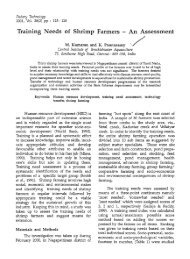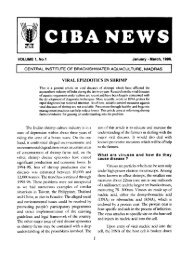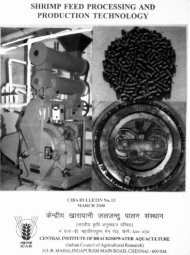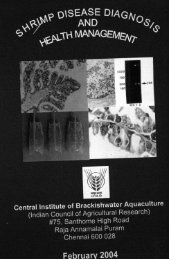4 - Central Institute of Brackishwater Aquaculture
4 - Central Institute of Brackishwater Aquaculture
4 - Central Institute of Brackishwater Aquaculture
Create successful ePaper yourself
Turn your PDF publications into a flip-book with our unique Google optimized e-Paper software.
Nat~onal workshop-cum-~ratning on Blolnfommtics and Information Management in <strong>Aquaculture</strong><br />
Policymaking requires a choice among a set <strong>of</strong> alternative options on the basis <strong>of</strong><br />
an objective assessment <strong>of</strong> their pros and cons. Policies are made either in a<br />
proactive mode to create new options and pathways, or in response to changed<br />
conditions or public pressure. Accordingly the information on parameters for<br />
policy development can provide insights into the issues and prevailing factors<br />
affecting them and suggest new options and implementation strategies and their<br />
likely consequences (Williams, 1996).<br />
3. Fishery policy typologies and management <strong>of</strong> information<br />
To have the information required for a fisheries policy, the prerequisite is the<br />
type <strong>of</strong> policy for which information is to be gathered. It could be approached in<br />
various ways and a number <strong>of</strong> typologies may be suggested (Garcia, 1999). For<br />
instance, by jurisdictional areas one can group policies in terms <strong>of</strong> national and<br />
international policies, where national policies cover both sectorai and intersectoral<br />
issues, while international policies deal with trans-boundary or transborder<br />
issues. On the other hand, policies can be specific to a particular<br />
production area or system, such as marine fisheries, inland fisheries, and<br />
aquaculture. The analysis <strong>of</strong> the priorities in the three main production systems<br />
(marine fisheries, inland fisheries and aquaculture) showed that, when properly<br />
expressed, most <strong>of</strong> the broad priority issues are common to the three systems<br />
and only a few specific differences exist. Nevertheless, management <strong>of</strong><br />
information and research aimed at strengthening and improving policies for<br />
fisheries in developing countries need to integrate three main levels <strong>of</strong><br />
consideration, such as: i) filling the information gap from a disciplinary point <strong>of</strong><br />
view; ii) providing an understanding <strong>of</strong> the policymaking process; and iii)<br />
identification <strong>of</strong> the main policy issues and challenges for information<br />
management.<br />
In case <strong>of</strong> fisheries, there are three priority areas for policy development:<br />
sustainable development and responsible fishing, food security and capacity<br />
building. Accordingly the information should be gathered and managed on the<br />
issues and options for each priority area <strong>of</strong> policy development. These are<br />
summarised in following paragraphs.<br />
4. Sustainable development and responsible fishing<br />
Policies that relates mainly to sustainable development and responsible fishing<br />
will reauire information on combination <strong>of</strong> various issues effectina - aauatic .<br />
systems (Garcia, 1999). These issues are:<br />
i<br />
ii)<br />
iii)<br />
iv)<br />
v)<br />
vi)<br />
vii)<br />
viii)<br />
conservation <strong>of</strong> resources and the environment for future generations;<br />
optimizing economic value (and efficiency) <strong>of</strong> the sector;<br />
promoting improved and fair trade;<br />
regulating access to resources;<br />
optimizing interactions between small-scale and industrial sectors;<br />
optimizing interactions with other sectors;<br />
improving governance; and<br />
accompanying socioeconomic transformation



